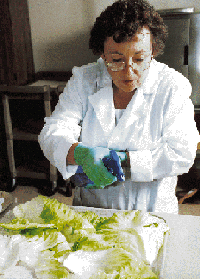Is there some form of homemade recipe or formula to make a germ cleaner the same or stronger than lysol.
Jim from Hamilton, Ontario, Canada
Add your voice! Click below to answer. ThriftyFun is powered by your wisdom!
I use a spray bottle and put rubbing alcohol in it. You can dilute it if you wish, about 1/2 and 1/2 with water, but I don't. I use it for cleaning light switches, door knobs, cabinet tops, windows, even my floors, etc, but I also spray a couple sprays in one hand and rub them together for a hand sanitizer. A real good germicide, and cheap too.
my favorite cleaner is plain soap and water in a spray bottle. you have to rinse but it works and is safer than the germicidal cleaners on the market. they leave an unsafe residue and gases in the air.
you can also try peroxide in a spray bottle.
borateem and vinegar kills a lot of germs too.
these things are all cheaper and safer than the store bought cleaners.
Jim, have you ever thought about using essential oils? There are many that are antiseptic and that disinfect. Tea tree is a great one. You would take a standard spray bottle and add anywhere between 20 to 30 drops of tea tree oil along with a few tablespoons of liquid soap. Shake well and spray and wipe surfaces. Also, using only about 8 to 10 drops of any one or any combination of these - lavender, cypress, orange, lemongrass, or grapefruit - you can create a bactericide or disinfectant to use as a surface spray or in washing water.
Regular soap kills all sorts of bacteria. The trick is to leave it on long enough to do the job.
For stubborn or mildewed spots, try a solution of tea tree oil, which kills fungus as well as germs.
Depends. If you are trying to just kill ordinary household germs, simple soaps are just fine. However, you mentioned "like lysol", and you must know by now that Lysol "original" formula was discontinued. It had Phenol, which is POISON. I don't know if this was why they discontinued, but
My preference is bleach/hot water, on surfaces that won't be damaged by it. Vinegar, Ammonia, tea tree,
and similar things are barely antiseptic, not strong enough to kill much at all, if anything. White iodine
kills fungus, and alcohol takes constant contact for 60 full min. to kill anything, hardly worth the effort
because bleach is instant, unless it's wiped onto something dark colored or not colorfast. Otherwise,
even though strong, when mixed 1/4 C. to 5 gallons
hot water, it's not too bad and cleans more than a few household germs, so I have read and experienced. I add 1 tablespoon of Lestoil for a great cleanser and deodorizer, but I don't clean a lot of area at one time, only about 5'x5' twice a day wiping, not saturating or soaking. If there are colds, flu, or similar illnesses, I wipe down everything I can
Occasionally I have used Betadine or Perioxide wash on the body, in the past, but only if suggested by a doctor for a wound, scratch, infected insect bite or something.
How the rumor got around that Vinegar, Ammonia, or other milder things such as this kills harmful germs surprises me. No one in the medical profession I worked in for three years would think of using these for anything other than simple floor, or grease, window cleaning.
Hope this helps. God bless you.
use essential oils in your standard cleaners or with water - use 1 drop of essential oil to each 10mls of liquid - thyme, lavender and eucalyptus. use a drop of neat thyme oil on a tissue to wipe down toilets.
Professor Susan Sumner came up with a wonderful "germ killer". I use it on my cutting boards and on all of my un-cooked veggies.Spray them with vinegar, then spray them with a 3% hydrogen peroxide solution (the normal strength sold in stores), the order doesn't matter. I rinse after but you don't have to. Food grade hydrogen peroxide is reccommended.

Be careful using tea tree oil around pets, as it is highly toxic. Also I have read vinegar is good for killing germs. Why must we wage war on germs with expensive product, when there are other product which do the job just as well and are less toxic?
.
Add your voice! Click below to answer. ThriftyFun is powered by your wisdom!